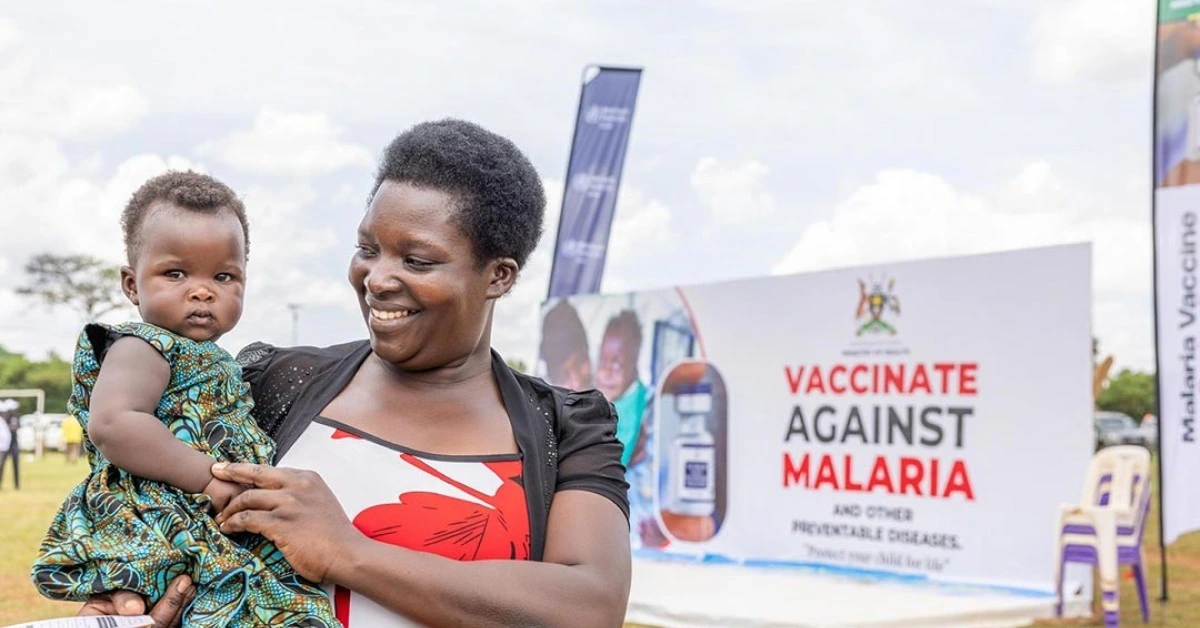
UGANDA – Uganda has officially launched a major malaria vaccination campaign targeting young children, marking a significant step in the country’s fight against the deadly disease.
The Ministry of Health, with support from Gavi, the Vaccine Alliance, and global partners like UNICEF, WHO, PATH, and CHAI, kicked off the rollout in Apac District, northern Uganda—one of the world’s worst-hit areas for mosquito-borne infections.
With this move, Uganda becomes the 19th African country to introduce the malaria vaccine into its routine childhood immunization schedule.
It is also the largest rollout so far, targeting 1.1 million children under the age of two across 105 high and moderate malaria transmission districts.
As of now, 18 countries have introduced the malaria vaccine with Gavi’s support. Of these, 14 began rollout in 2024, including nations like Nigeria, Cameroon, Sudan, and the Democratic Republic of the Congo.
Ghana, Kenya, and Malawi were the first to introduce the RTS,S vaccine in 2019 through the Malaria Vaccine Implementation Programme (MVIP) and have since expanded routine use.
In 2025, six to eight more countries—including Mali, Ethiopia, and Guinea—are expected to launch the vaccine, following recent rollouts in Burundi and Uganda.
The vaccine being used, R21/Matrix-M, is administered in four doses—at 6, 7, 8, and 18 months of age.
Apac, the launch site, records more than 1,500 mosquito bites per person each year, making it one of the most affected areas in the world.
Malaria remains the leading cause of illness and death among children in Uganda. According to WHO data, the disease accounts for up to 40% of outpatient visits, 25% of hospital admissions, and 14% of all hospital deaths in the country.
Speaking during the rollout, Dr. Jane Ruth Aceng Ocero, Uganda’s Minister of Health, called the introduction of the vaccine a major milestone.
“This vaccine is expected to prevent around 800 severe malaria cases every day. It will also reduce the financial burden on families, saving each family about UGX 15,000 per treated case,” she said.
She urged all parents and caregivers to take children for all four doses, emphasizing that complete vaccination is essential for full protection.
Gavi, which coordinates the global malaria vaccination programme, is providing financial and logistical support for vaccine delivery. However, the organisation warned that sustained support is necessary.
Dr. Sania Nishtar, CEO of Gavi, said: “Without long-term funding, life-saving programmes like this could be scaled back, putting millions of children at risk.”
To prepare for the campaign, Uganda’s Ministry of Health distributed over 2.2 million vaccine doses across the country.
The Ministry also launched community engagement drives involving MPs, religious leaders, and cultural figures to raise awareness and increase vaccine uptake.
UNICEF, which handled vaccine procurement and public education, emphasized the importance of combining the malaria vaccine with other preventive measures like mosquito nets.
Dr. Robin Nandy, UNICEF’s Uganda Representative, said: “This is a breakthrough for child health. The vaccine offers added protection, but parents must ensure their children receive all four doses.”
WHO praised the launch, calling it a “historic turning point” in malaria control efforts. Dr. Kasonde Mwinga, WHO’s Uganda Representative, said: “This vaccine is a game-changer. It will help save lives and secure a healthier future for Uganda’s children.”
XRP HEALTHCARE L.L.C | License Number: 2312867.01 | Dubai | © Copyright 2025 | All Rights Reserved